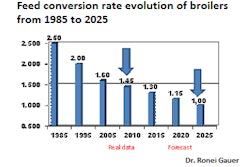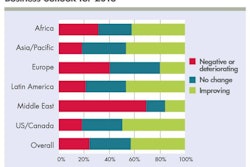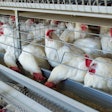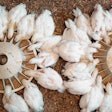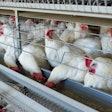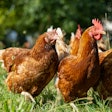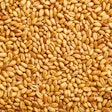Egg weight remains a quality factor in certain markets, worldwide, and especially where eggs are sold and bought fresh. Controlling egg weight can be a difficult exercise as several factors are implicated. In fact, a large egg is not always a “good” egg, because with increasing egg size, eggshell thickness is reduced as a hen will deposit only 2 grams of calcium per egg, no matter its size! Nevertheless, when egg weight needs to be increased, the following four steps can be taken:
1. Control hen body weight
It is well known that heavier hens produce heavier eggs, assuming they receive enough nutrients to support their needs. Indeed, brown-egg layers tend to produce slightly larger eggs because they have a heavier mature body weight compared to smaller white-egg layers. But, even within a certain hybrid, it is possible to slightly increase egg weight by increasing mature body weight. This is best achieved by ensuring pullets enter egg production with a large enough frame (and associated body weight) to support a gradual increase in body weight, that is mostly muscles and not just body fat.
2. Increase feed intake
As long as the hens continue to grow, this is directly connected with the above measure. But, after reaching mature body weight, a slight increase in feed intake will most likely result in heavier eggs without further increasing body weight. This implies that hens have the genetic potential to produce heavier eggs, and the extra feed is balanced to support egg production (in terms of protein quality) instead of just lipid deposition (if it contains just excess energy).
3. Increase and balance protein intake
Extra feed will produce heavier eggs, and will increase body weight because most likely it will provide more energy than protein. To avoid this, it is possible to provide the extra protein directly by feed reformulation. To this end, egg weight responds to methionine levels during peak production, but not during the later period (when, it is egg numbers that responds to methionine supplementation).
4. Linoleic acid
There is a growing body of data supporting the notion that supplementing layer diets with linoleic acid may increase egg weight. There is some obscurity on this issue as concentrated sources of linoleic acid are oils that increase dietary energy concentration. Nevertheless, formulating to a higher linoleic acid concentration even at similar dietary energy levels is something that many nutritionists focus on when attempting to increase egg weight without providing extra energy to layers.
Extra cost
It should be noted that any benefits from increased egg weight must always exceed the cost of feed required to produce and maintain heavier hens. Under most commercial conditions, it is more cost effective to increase total egg mass (number of eggs x egg weight) than individual egg weight alone. But, when a market premium is paid for large and extra-large eggs, then the above measures can be employed.


